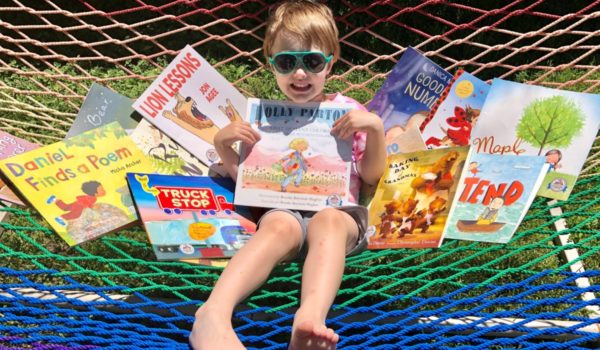
Imagination Library of Johnson County promotes literacy for every child
By Jessica Dyer Campbell
She thought she could … increase the literacy skills of kindergartners in Johnson County.
She thought she could … get kids excited about reading.
She thought she could … hand out free books to Johnson County children.
So she did.
Taking a cue from Dolly Parton’s favorite children’s book, “The Little Engine that Could,” Franklin resident Susan Crisafulli founded Imagination Library of Johnson County to help raise literacy rates in Johnson County schools by providing free books to children before they enter the school system. It’s one of many local affiliates of Dolly Parton’s Imagination Library.
The Imagination Library was started in 1995 by the eponymous country music star. It provides a free book each month to enrolled children, from birth to age 5. Books are chosen by the national program and are different for each “cohort” of children. For example, a child born in 2017 won’t receive the same 60 books as their sibling born in 2019. Each child receives a copy of “The Little Engine that Could” as their first book.
Local affiliates, such as Imagination Library of Johnson County, secure funding to distribute books to their communities through the program. The program has distributed more than 145 million books worldwide to preschool-age children.
Helping young readers today
Some 1,600 young readers have been served by Imagination Library of Johnson County since its inception in 2017.
“I find a lot of comfort in that books are something that join us together,” says Crisafulli, an English professor at Franklin College. “The books themselves bring families together.”
Kate Johnston, of Franklin, her 1-year-old son, James, and her 3-year-old daughter, Regan, are one such family. Both kids are enrolled in the program (James since birth and Regan since 11 months old). Johnston appreciates the age-appropriate books that come each month, especially because the books have characters from diverse backgrounds — for example, socioeconomic, skin tone, ability — that spur thoughtful conversations.
“It seems like these books come at the moment when my kid is ready for them,” she says. “Something I didn’t expect, that I think the Imagination Library does so well, is providing a means for dialogue between caretaker and child. We’re able to talk about things that we didn’t normally talk about.”
Of the 12 books children get each year, two books have bilingual Spanish and English text. Regan loves to hear Johnston, a Spanish teacher at Franklin College, read these books in both languages. Reading together is a great way to bond with her children and inspire them.
“The creativity that I have witnessed from our 3-year-old, she reenacts a lot of stuff that she reads,” she says. “I see it become part of her imaginary play.”
Improving literacy skills
In 2015, Crisafulli, an English professor at Franklin College, taught an immersive community-based class called “The Power of Literacy” where her students helped elementary schoolchildren with literacy skills.
“There is one teacher to 25 kids, and the students don’t always get that individual attention that my students were doing,” Crisafulli says. “I recognized the need for books in our area.”
The data she found on literacy, both nationally and locally, moved her to action. She partnered with the Johnson County Community Foundation to get her program up and running. This year, Imagination Library of Johnson County became its own nonprofit organization. Crisafulli is its president.
According to ProLiteracy, an adult literacy organization, a child’s ability to read proficiently by Grade 4 (when children begin to read to learn, rather than learn to read) has a profound effect on the child’s ability to succeed later in life. Lower literacy rates are linked to poverty, incarceration and unemployment, among other things. As a researcher, the data spoke to Crisafulli — 68% percent of U.S. fourth graders have below-proficient literacy skills, according to the Annie E. Casey Foundation — and moved her to put books into the hands of kids who may have no books in their home.
As Crisafulli talked with children, she found that to be the case. The only books in their home were library books. “No wonder these kids are struggling with reading. They don’t have access at home,” she says. “The need felt so great.”
She knew early intervention was important, too. Some children enter kindergarten not knowing what to do with a book or how to hold one, for example.
“I saw that as a librarian,” says Heather Harris, a former elementary librarian and current board member for Imagination Library of Johnson County. “You could tell which children had been read to.”
And that’s why she got involved with the Imagination Library. “Literacy is kind of fundamental to my being,” she says. “And this is an amazing program that has the potential to affect the literacy rates in Johnson County.”
Plans to expand
Right now, Imagination Library of Johnson County doesn’t have the funding to send books to kids in every part of Johnson County. “Our real goal is to cover all of Johnson County and the Greenwood ZIP codes,” Harris says. “But there is a huge financial obligation there because it’s so populated.”
Since the Imagination Library is a donation-driven organization, Crisafulli and the board of directors partner with civic organizations, local businesses and individual donors to maintain the program’s funding, along with securing grant money. Yearly book costs for one Johnson County child tally to $25.
Harris works that yearly donation into her family’s holiday traditions, telling her children, “Let’s sponsor a kid this year. We don’t know them, but we are helping our community.”
As Imagination Library of Johnson County copes with COVID-19 disruptions to in-person events, it has shifted and will host a biannual fundraiser for Children’s Book Week online. In mid-November, it planned to have Franklin community leaders sit down to read a book over video chat, much as Parton did in the spring.
Regan, Kate Johnston’s daughter, relished those virtual readings and would make sure to have her book handy to page through as Parton read.
“Every week she wanted to make sure to watch Dolly read the story,” Johnston says. “She thinks she has a real relationship with this person. So we can talk about being philanthropic and how she’s given back to our country and community.”
Literacy Tips for Young Readers
Many books from the Imagination Library come with a parent guide that includes questions to ask and other ways to engage the child in the story. Both Crisafulli and Harris provided tips to help foster a love of reading in young children, including:
“Consistency in reading is so important,” Harris says. Read at a consistent time each day — at bedtime, for example — or in a consistent location, such as a special reading chair.
Read the title and ask the child what they might expect the book to be about.
Consider that the artwork in children’s books is intentional; ask about what the child observes on the page, especially if they can’t read yet. Ask the child to identify objects of a certain color, shape or letter sound (“What do you see that starts with F?”) in the artwork.
If you have read a particular story many times, pause while reading the story to see if the child can fill in the next word. “It could be fun and funny. It makes the kid feel good, like they’re the author,” Harris says.
After the book is finished, ask the child to retell the story in their own words.
For more information, to sign up a child or to donate, visit Imagination Library of Johnson County’s website: imaginationlibraryjoco.org.


